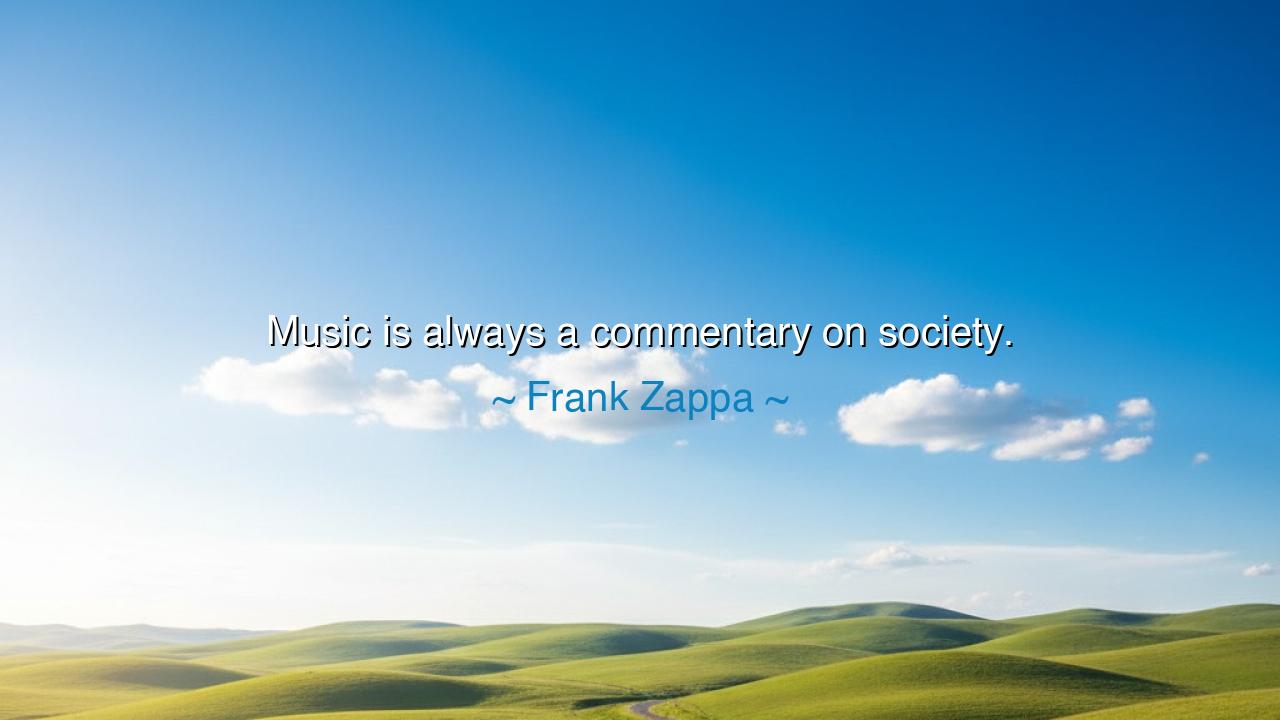
Music is always a commentary on society.






Hear the voice of Frank Zappa, wild prophet of strings and satire, who declared: “Music is always a commentary on society.” These words resound like a drumbeat across the ages, for they remind us that music is never only sound—it is spirit, it is protest, it is praise. It is the heartbeat of the people, the mirror of their sorrows and joys, their rebellions and their hopes. Through melody and rhythm, a society speaks of what it fears, what it loves, and what it dares not say aloud.
For music is not created in the void; it is born from the lives of men and women. When the people suffer, their songs are heavy, carrying grief like a funeral procession. When the people are free, their songs are light, dancing with laughter like spring rain. Even when no words are sung, the sound itself becomes a commentary: the war drums of armies, the hymns of cathedrals, the laments of slaves, the rebellious chords of rock and jazz. Each note is the echo of a culture’s soul.
Consider the spirituals sung by enslaved Africans in America. Outwardly they were hymns, but hidden within their verses were messages of endurance, resistance, and the dream of freedom. “Follow the drinking gourd,” they sang, guiding one another to the North Star and to liberty. Here music was both survival and secret rebellion, a commentary on a society that denied their humanity. Their masters may have heard only hymns, but the slaves heard the sound of their unbroken will.
Think also of the protest songs of the 1960s, when America convulsed with struggle. Bob Dylan’s “Blowin’ in the Wind,” Joan Baez’s anthems, and the fiery chants of civil rights marches—all were music that carried the cries of a generation. They were not just art; they were weapons, breaking silence, inspiring action, holding a mirror to injustice. The commentary was unmistakable: a society divided by war, by race, by inequality, yet yearning for change. Without the music, the movement would have lost much of its fire.
Even in classical times, the same truth resounds. Beethoven’s “Eroica Symphony” was composed in admiration for Napoleon, whom he once believed a liberator. Yet when Napoleon crowned himself Emperor, Beethoven tore the dedication from his manuscript in fury. His music became a commentary on betrayed ideals and the corruption of power. Long before words could be freely spoken, notes carried meaning too bold to suppress.
The wisdom of Zappa’s words is this: music is never neutral. Whether intentional or not, it reflects the state of the people who create it and the world that shapes it. A pop song of shallow pleasures tells as much about its society as a ballad of protest or a hymn of worship. By listening carefully, we hear not only tunes, but the deeper story of our age—the anxieties, the distractions, the courage, and the longing for something greater.
The lesson for us is clear: do not listen to music only with your ears. Listen with your heart, listen with your soul. Ask what it says about the society that birthed it. Ask also what your own music says about you. And let your songs, whether whispered to your children or shouted in the streets, become a commentary that uplifts, that awakens, that honors truth.
Therefore, O listener, let your actions be these: cherish the songs of your people, for they are the record of who you are. Support the voices that sing against injustice, and do not dismiss the melodies of the oppressed. Make your own music a commentary worth remembering, not a hollow echo of distraction. For when the story of our time is told, it will not only be written in books—it will be sung, carried on the breath of rhythm, declaring to future generations what kind of society we were.






AAdministratorAdministrator
Welcome, honored guests. Please leave a comment, we will respond soon